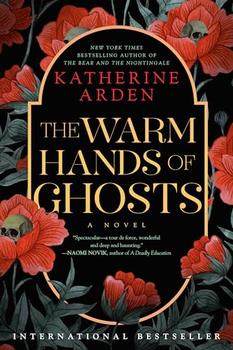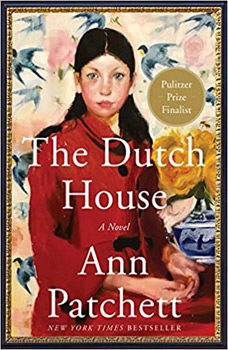Summary | Excerpt | Reviews | Beyond the book | Read-Alikes | Genres & Themes | Author Bio

A Novel
by Katherine Arden"Was remembered agony better than feeling nothing at all?" This open question from protagonist Laura Iven is at the epicenter of Katherine Arden's war-torn The Warm Hands of Ghosts.
The Iven siblings, Canadians serving in World War I, have their lives upended in the bloody final years of the global conflict. After a bomb lands on the hospital where she is stationed and nearly takes her leg, older sister Laura is honorably discharged from her duties as a frontline nurse. Nonetheless, tragedy follows her back home to Halifax. When a ship in the nearby harbor catches fire, the blast radius kills both mother and father of the Iven family. Mere days later, the orphaned Laura receives news that her beloved younger brother, Freddie, has likely died in the European trenches. Lingering doubts lead Laura to venture back to the front to uncover the truth behind Freddie's mysterious disappearance. Meanwhile, Arden's novel follows Freddie's perspective from around a year earlier as he forms a blood bond with a German soldier, Winter. Together, no longer caring that they are supposed to be enemies on opposing sides of the war, they team up to escape the horrors of the trenches. As the narrative progresses, both siblings are drawn towards the mysterious machinations of Faland, a hotelier who promises the wounded respite, wine, and beautiful violin music — but at a heavy cost.
Arden creates a historical setting that fuses the scientific and brutally realistic with the supernatural and occult. The third-person narration alternating between Laura's and Freddie's perspectives is candid about WWI's horror and viscera. Men's broken bodies fall to pieces on stretchers. Soldiers plead for death as they drown in trench mud. Laura's hands are terribly scarred by infections transmitted from the wounded and dying. Against these unromanticized depictions of physical trauma, The Warm Hands of Ghosts delves into darkly fantastic ways of coping with warfare's psychological trauma. Soldiers, driven mad, report phantoms of dead comrades. Laura, herself staunchly scientific and disbelieving in mysticism, is haunted by her deceased mother and doubts her own sanity. She witnesses women performing seances, desperately attempting to communicate with lost loved ones, and capitulates to her mother's apocalyptic, biblically-coded fatalism: stories of Armageddon, in which "the infallible judgement of God" — with awful "pageantry," including "The Four Horsemen, the Beast from the Sea, the devil riven and falling," and "Fire from heaven" — unleashes "Rewards for the good, and punishments for the wicked." Laura's rationality surrenders to this bleak fortunetelling: "And you were right, Maman … It caught us after all. War, plague, famine, death, the sky on fire, the sun black … you couldn't stop anything. But at least you knew it was coming. The end of the world."
While Laura acknowledges the power of the war machine, strong women like herself are the ones who progress the novel's plot; The Warm Hands of Ghosts is built on the persistent agency of women during historically tumultuous events. Initially, Laura comes across as judgmental, bitter, and even abrasive. But as her characterization unfolds, her no-nonsense attitude is revealed as painstakingly developed in response to her work on the European front and the subsequent familial tragedy. Beyond Laura's coldness and cynicism, Arden shows her heart to be stubbornly motivated by love beyond all hope, as she determinedly seeks out her brother even when evidence points solidly to his demise.
Another thoughtful exploration of femininity confronting war is Pim, a widow who has lost her son to the trenches and accompanies Laura back to the front. Though Laura first expresses condescending pity towards Pim's antiquated, Victorian-Edwardian attitudes in their new age of destruction, the two eventually support each other in a moving depiction of women's solidarity in the face of grief and loss. Pim also reveals herself as more than the archetypical beautiful, ditzy nice girl, the embodiment of the selfless, sensitive angel of the household whose sole purpose is to comfort the tormented men of the world. She skillfully weaponizes these projections to, like Laura, help her loved ones as best she can.
Fascinating is the mysterious, seemingly out-of-place hotelier, Faland, who recurrently appears before the protagonists during harrowing moments in their desperate struggle for survival. Laura first stumbles upon Faland's "ruined hotel" while seeking temporary refuge after a bomb disables the lorry returning her to the front; Freddie, making Faland's acquaintance after overhearing him order a trench newspaper advertisement for his "evening revels," shelters in his cellar overnight as part of his devotion to preserving the gravely injured Winter. In both cases, Faland is a miraculously hospitable host — as he claims, "I serve wine, I listen, and occasionally I play a violin." But despite the magic and warmth of his aura, both Laura and Winter quickly sense the cracks in his façade. The ghosts that swirl menacingly around him foreshadow that his beautiful revels are not to be taken at face value, especially pertaining to his plans for Freddie.
Of course, these complex characterizations take time and space to construct. In its first half, the pacing of The Warm Hands of Ghosts is slow as Arden builds up her characters. Following Laura back to Europe to get to the tumultuous front and Faland is particularly strenuous. The careful worldbuilding and character-building has a satisfying payoff once Laura's and Freddie's narrative lines converge in the Forbidden Zone. A suspenseful unraveling ensues, which leaves little room to fully develop the budding romance between Laura and a frontline doctor, Jones. However, none of this detracts from Arden's meaningful exploration of traumatic violence, fractured history and selfhoods, and superhuman attempts at putting oneself back together. In The Warm Hands of Ghosts, the past calls out to the present in the same way that ghost stories entice even the most skeptical.
![]() This review was originally published in The BookBrowse Review in March 2024, and has been updated for the
January 2025 edition.
Click here to go to this issue.
This review was originally published in The BookBrowse Review in March 2024, and has been updated for the
January 2025 edition.
Click here to go to this issue.

If you liked The Warm Hands of Ghosts, try these:

by Anne Michaels
Published 2025
A breathtaking and ineffable new novel from the author of the international best sellers Fugitive Pieces and The Winter Vault—a novel of love and loyalty across generations, at once sweeping and intimate

by Ann Patchett
Published 2021
Ann Patchett, the New York Times bestselling author of Commonwealth and State of Wonder, returns with her most powerful novel to date: a richly moving story that explores the indelible bond between two siblings, the house of their childhood, and a past that will not let them go.
Fanaticism consists in redoubling your effort when you have forgotten your aim
Click Here to find out who said this, as well as discovering other famous literary quotes!
Your guide toexceptional books
BookBrowse seeks out and recommends the best in contemporary fiction and nonfiction—books that not only engage and entertain but also deepen our understanding of ourselves and the world around us.